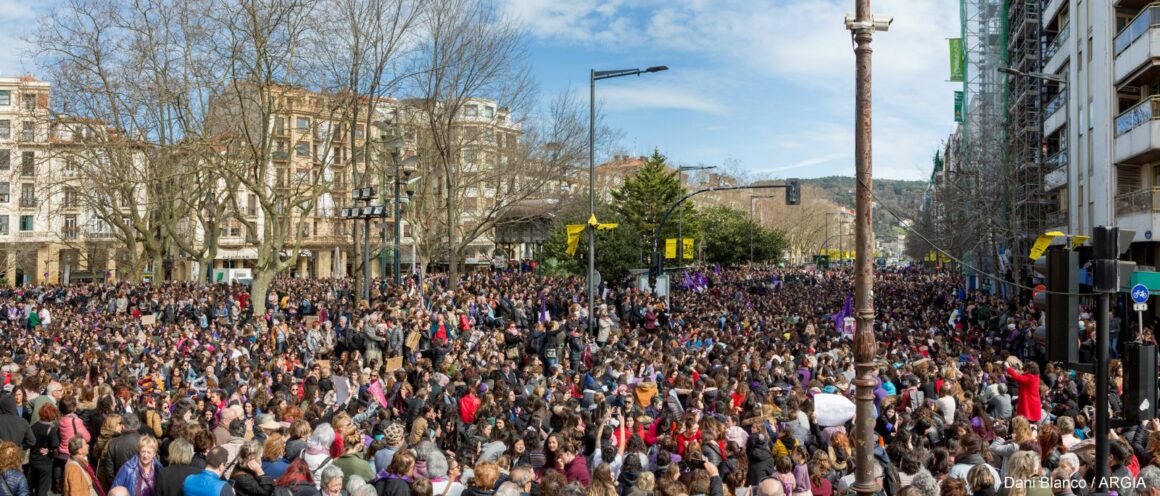By John Hird
More than 1500 workplace committees supported the call for the Feminist General strike in favour of the collective right to social care. The strike was supported by the majority Basque unions — ELA, LAB, Steilas, ESK, EHNE, ETXALDE and CGT — and the Feminist Movement of the Basque Country.
Mobilisations took place in more than 100 towns in the morning, and massive marches took place in Bilbao, San Sebastian, Vitoria-Gasteiz and Pamplona, in the evening of November 30th. In addition, during the day, 25 marches took place in many towns. The organisers called the Feminist strike “historic and unprecedented.
The strike committee claimed 70% support in public education, which as well as teachers also included canteen, auxiliary and cleaning staff. The strike was also supported in local government and the Basque health service. There were early morning pickets at major factories such as Mercedes and Michelin. EITB, the Basque TV and Radio service could only broadcast limited news programmes and Euskotren (Train) and Metro only provided minimum services.
The ruling PNV (right-wing Basque nationalist party) imposed an abusive ‘minimum services’ policy in retirement homes and day care centres, which seriously eroded the right to strike of the lowest paid women workers. PNV also utilized the Ertzaintza (Basque police) to prevent the right to picket large factories in the private sector and several brutal police charges took place with women injured and arrested.
The successful strike was indeed “general”, meaning that both women and men were called out on strike. The organisers stated that “the care crisis affects everyone; we all need to care and to be cared for with dignity throughout our lives”. Despite care being indispensable for young and old for a dignified life, the labour has always been hidden, unrecognized, unpaid, made invisible in our homes and what is more, almost exclusively falls mainly on the shoulders of women”.
Given the success of the strike it was disgraceful that the two major Spanish unions, CCOO and UGT failed to support it.
The organisers also denounced the fact that “paid care work has become precarious as a result of the privatisation and subcontracting of care services”. Only 10% of care homes in the Basque Country are managed by the public sector. In addition, the private centres for the elderly offer an insufficient service and are managed by companies that put their own profits before the interests of the people”.
The Basque Feminist General strike took place five days after the International Day for the Elimination of Violence against Women. The Feminist Movement of the Basque Country linked the strike on 30 November to the endemic violence against women. They said, that is job insecurity, despicable working conditions and the non-valuation of the care work that women carry out in the home is also economic violence.
Four women and one child were murdered in the Basque Country in 2023
Between April and June of this year, 1,637 complaints were registered in the courts for violence against women, compared to 1,495 in the same period in 2022. There were 1,637 women victims, 11.2% more than in the second quarter of last year, when 1,472 were registered. 98 women took exemption from the duty to testify, 29.5% less than a year ago. The rate of gender violence (victims per 10,000 women) stood at 14.3 in the Basque Country, below the national average of 19.2. Four women and one child were murdered in the Basque Country in 2023.
In Spain as a whole in the second quarter of 2023, Spanish courts received a total of 48,227 complaints, 5.43% more than in the same period of the previous year, when 45,743 were registered. There were 47,063 female victims of male violence, 5.66 % more than a year ago, when 44,543 were recorded.
The statements of the Feminist Movement and trade unionists make it clear that women are fed up with mere “feminist” gestures of political parties and capitalist institutions, which do nothing to end the epidemic of violence against women and achieve real social and economic equality:
In this line, they denounced that “these terrible murders are the extreme consequences of macho violence, which has multiple faces and which women, trans and lesbian women suffer daily in the workplace, in the street and at school”.
In the Basque Country there are adverts on the buses, trains and trams condemning violence against women. Such initiatives are welcome along with anti-violence education in schools. However, a consciousness has developed, amongst especially young women and women workers, that change is not happening fast enough.
The violence against women and economic inequality continues and there is a feeling that ‘official’ capitalist institutions are paying lip service to the problems women face. “Proposals or measures without resources are not of any use to us”. They added that women are fed up with their demands being diluted and replaced by pretty words which cover up superficial proposals that end up as worthless ‘institutional’ photo ops.
The Feminist General strike of November 30th in the Basque Country should be the music of the future. It is highly significant that militant Basque unions and feminist collectives are linking the question of violence against women to the economic oppression of women and the working class in general. Far from being divisive, the strike has served to forge a unity between working class women and men in favour of a real struggle to improve the conditions of everyday life. It also put a clear marker down that the ‘empty gesture feminism’ of capitalism, (echoed by reformists and liberals) which is devoid of a real programme for change has been exposed. The capitalist ‘status quo’ of continued violence against women and inequality is unacceptable to increasing numbers of our class and November 30th shows that women are turning to their unions to change their material and social conditions.
In the Basque Country and Spanish state, Socialist Alternative is fighting for the following programme:
International level struggle of socialist feminism, which defends the demands of working women with the tools and together with the rest of the working class and all oppressed classes, against liberal feminism which only aims to feminise the capitalist elites.
Economic and employment equality between men and women: equal pay for equal work, decent minimum pensions (which mainly affect women), no discrimination in the workplace on the grounds of being a woman, being pregnant or having a family.
For the socialisation of care. The large investment in public services (see above) must be aimed at the socialisation of care, which is traditionally carried out in the home and mostly by women. This implies the extension and improvement of public services such as care for dependents and public health, but also improvements in compulsory education, free childcare, etc.
Free, public and free abortion! Free access to contraceptives and assisted fertilisation, without accepting any restrictions based on marital status or sexual orientation. The right to choose to be mothers or not, when and with the number of children we want.
An end to sexist and sexual violence. Investment in protection measures and resources for victims of gender and sexual violence and trafficking (health and psychological, housing, employment, benefits, etc).
Real affective-sexual education at all levels of education, which should include education on consent, equality and against sexist and sexual violence, and LGTBI-phobia.












